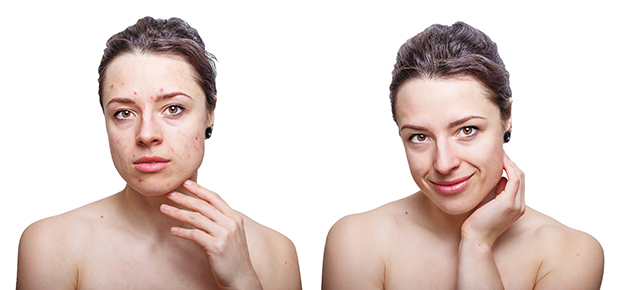
Submitted by Doug Leone, MD and Adrienne Schupbach, MD, Dermatology and Mohs Surgery Institute
We usually think of acne as a teenage problem, but many people — especially women — continue to have acne well into their adult years. And for some, acne appears for the first time in their 20s, 30s, 40s, and even 50s! It is estimated that over 50 percent of all women ages 21 to 30, 25 percent of women ages 31 to 40, and 12 percent of women ages 41 to 50 suffer from acne. The incidence of adult acne seems to be increasing, and it is quite common for women to be fighting acne and wrinkles at the same time.
Acne forms in the same way whether you are 15 or 50. Teen acne usually appears as many smallish bumps on the forehead, cheeks, and chin, while adult acne is characterized by bigger, more inflamed nodules that typically appear on the side of the face, chin, and back.
Adult acne is most likely caused by changing hormone levels. While hormones usually calm down once the teen years are over, hormone fluctuations due to the menstrual cycle, pregnancy, and perimenopause can cause break outs to occur. Stress can also cause hormonal changes which, in turn, may exacerbate acne. Even “happy stress,” like your wedding day, can trigger an acne flare-up. It is believed that our bodies produce certain hormones in response to stress that stimulate the oil glands. If you are under constant stress, which is not unusual for women juggling work, home, and family, this may be a cause for acne that is continuous.
Hormones can also become out of whack due to Polycystic Ovarian Syndrome (PCOS), which is a health condition caused by an abnormal balance of hormones produced by the ovaries. Many women do not even know that they have this condition, but the overall health implications are quite serious and it is very important to seek treatment. One characteristic symptom of PCOS is acne that first appears as an adult.
Following are some other things that may cause or aggravate acne in adults:
- Skin-care products. You may be using the wrong products, too many products, or cleansing too often or too aggressively.
- Hair-styling products. Gels, mousse, or sprays can all affect the facial skin.
- Diet. While studies have not shown that foods like chocolate or French fries cause acne, everyone reacts differently. Foods that seem to be connected to acne breakouts include dairy products, refined carbohydrates, high sugar foods, and foods high in sodium. Eliminating or reducing these foods may help acne and is also good for your overall health.
- Some medications can trigger acne.
- Many adults think they have acne, when they really have rosacea, which is a completely different condition that looks similar.
Acne treatments will usually make rosacea worse. A dermatologist can determine if you have acne or rosacea and develop an appropriate treatment plan.
There are many treatments for acne. When it comes to topical creams or gels, the same ingredients that are effective for teen acne may help adult acne as well. However, adult skin is more prone to irritation — so you need a gentler, more moisturizing approach. If acne is caused by hormonal imbalance, then topical treatments won’t really help because you must address the underlying internal cause. There are many prescription medications, both topical and those taken by mouth, that are more effective than over-the-counter remedies to resolve acne breakouts. Laser and light therapies, administered by a professional, may also be effective. These powerful rays can penetrate the skin and eliminate that bacteria that is causing the acne.
While acne at any age is not a serious health threat, adults with acne frequently suffer social, psychological, and emotional consequences. Therefore, it is not a condition that should be ignored or considered a trivial problem. Almost every case of acne can be controlled with help and advice from a dermatologist.
For more information or to schedule an appointment, you may contact the Dermatology and Mohs Surgery Institute at 309-451-DERM (3376) www. dermatologistbloomington.com. Dr. Leone and Dr. Schupbach, both residents of Bloomington, are board-certified dermatologists, specializing in both medical and cosmetic dermatology, including the treatment of skin cancer, moles, acne, rashes, warts, and all skin disorders. Their practice, is located at 3024 E. Empire St., in the Advocate BroMenn outpatient center.

